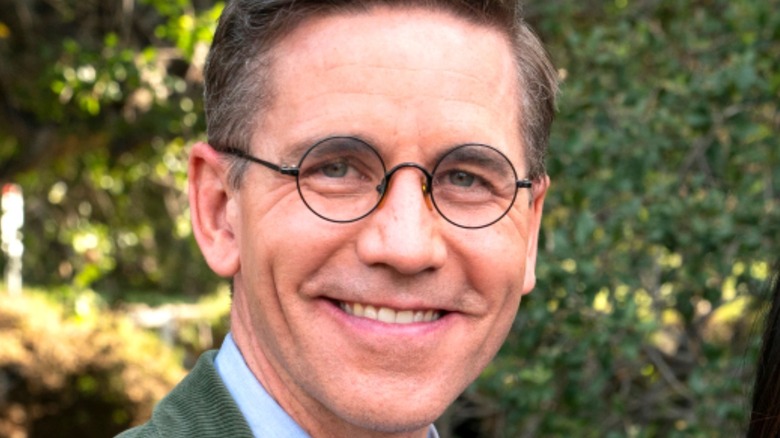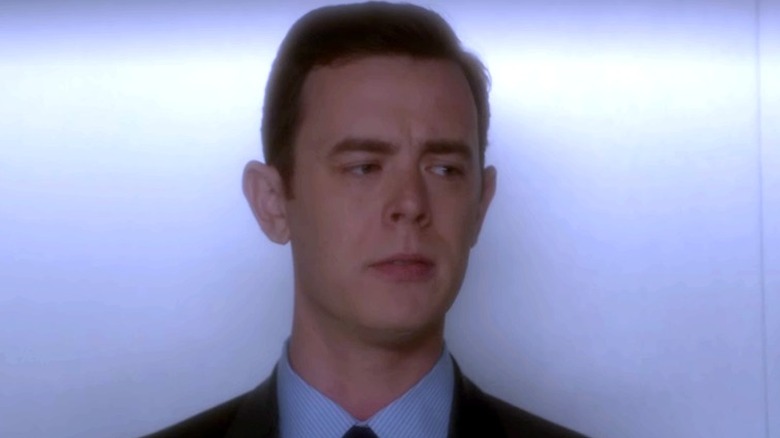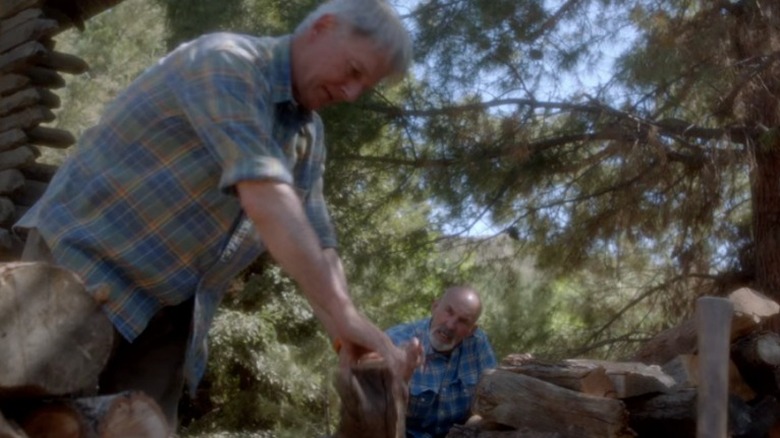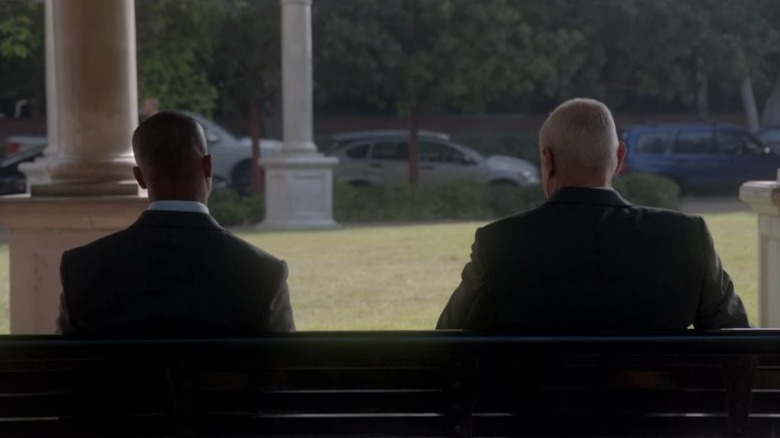The Ending Of NCIS Season 10 Explained
After birthing a number of spin-offs and making it well into its 19th season, Donald P. Bellisario and Don McGill's "NCIS," has finally seen a dip in ratings — one that some believe is due to the departure of its long-time series protagonist, Mark Harmon's Leroy Jethro Gibbs (via TV Line). For years, Gibbs' steadfast search for justice and the fierce loyalty his integrity and determination generated in his NCIS team have been among the show's most consistent and consistently successful narrative elements, all of which are on full display in its Season 10 finale, titled "Damned If You Do."
In the episode, Gibbs faces scrutiny for his long-upheld habit of going rogue and even breaking the law (and subsequently covering it up) in order to bring criminals to justice, often at the cost of the lives that, arguably, didn't need to be lost. Gibbs, his attorney, and his most devoted agents — Cote de Pablo's Ziva David, Sean Murray's Timothy McGee, and Michael Weatherly's Anthony DiNozzo — escape to a remote cabin to work things through in the 48 hours he has before his trial. Ultimately, in order to squash the case against Gibbs, all three agents sacrifice themselves for their leader, taking full credit for the many legitimate accusations made against him, and buying Gibbs time to clear his name and untangle a mysterious web of treachery and lies. The cliffhanger ending, which jumps ahead in time and finds Gibbs working on a secret mission for the JSOC, goes a long way toward leading the show into its 11th season, but has little to do with the finale's overarching exploration of "right" and "wrong."
The finale of Season 10 proudly owns its tropes
In an imagined conversation with Gibbs' deceased mentor Mike Franks (Muse Watson), Franks hits him with a series of cliche "cowboy cop" platitudes such as "listen to your gut" and "shoot first, ask questions later." In reality, this is the kind of mentality that leads to grave miscarriages of justice, but in the world of the police procedural, the agent who just doesn't play by the rules (see: Christopher Meloni's Elliot Stabler) is often a series' protagonist. This is certainly the case for Gibbs, and the finale isn't shy about depicting his often fatal decision-making and rule-breaking as a necessary evil, so to speak, in the fight against crime.
The episode posits the D.O.D.'s IG investigator Richard Parsons (Colin Hanks) as the villain. His dad bought him his Harvard education, he's a merciless career climber, he hates Gibbs, and, worst of all, he believes NCIS should have to abide by pesky constitutional rules that govern the actions and define the limits of law enforcement. The finale could have complicated this dynamic by revealing Parsons as a hypocrite, or as someone with an agenda to push other than his career and how "law enforcement should follow rules," but it boldly chooses not to. Both Gibbs and Parsons genuinely believe they're on the right side of the debate, but the episode makes it abundantly clear that, in the world of "NCIS" at least, it's Gibbs who's right.
Season 10 backs Gibbs' definition of right
In a conversation with Parsons, NCIS Director Leon Vance (Rocky Carroll) says, "sometimes you have to ruin a good pair of shoes to do what's right." He's referring, of course, to both his refusal to betray Gibbs, and to some of the less savory tactics used/actions taken by the agent and his team (e.g., those outlined here on Reddit), which he believes are justified. Parsons responds by asking Vance if he's sure that what he's doing is right, bringing the finale's main theme into focus.
There are instances in the episode where Gibbs' "rightness" is questioned — his lawyer A.J. Chegwidden ("JAG's" John M. Jackson), for instance, wonders if the deaths of several characters at Gibbs' hand were actually necessary. However, it's clear the audience is meant to see his actions as just. Not only were these deaths depicted as unavoidable in the context of the series' overarching narrative, but the finale continually portrays Gibbs (in ways both subtle and overt) as a righteous, salt-of-the-earth Man of Integrity who's beyond reproach. We see Gibbs chopping wood at a cabin he built himself while telling Chegwidden that he's always had to work. In the next scene, Gibbs refuses to let his agents play dirty with Parsons. Sure, he's made some mistakes, the finale says, but he chops his own wood and takes the high road, so the D.O.D. should just trust that he always does what's right.
Damned If You Do (eventually) asks audiences to question who decides what's right
For all its romanticization of Gibbs, eventually, "Damned If You Do" eases up on its straightforward interpretation of the agent. The episode sees the team tackle the mysterious decapitation of a radiated Navy SEAL, an investigation that leads Tom Morrow (Alan Dale of "Law & Order: SVU") to confess that the CIA was actually behind the death of Ziva's Mossad Director father, Eli David (Michael Nouri). While the connecting subplot doesn't exactly indict the ever infallible Gibbs, it does bring up questions about who gets to decide what's right, albeit using the CIA's actions rather than those of NCIS. It's a way for the finale to approximate some portion of philosophical complexity without tarnishing its hero, and one that subtly forces audiences to question their initial understanding of Parsons.
When it comes to global politics, issues of right and wrong are subject to both the hindsight of history and the ideologies and motivations of a given nation. Likewise, while it's easy to see Parsons as a ruthless antagonist who simply wants to take down NCIS to advance his career, the finale hints that his mistrust of Gibbs isn't all that different from the American public's mistrust of agencies like the CIA — agencies who are given a wide berth when it comes to making difficult, often fatal and controversial decisions in the name of what they see as "right."



